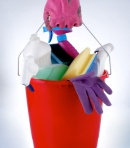 A clean house is just a quick and easy spray or squeeze away according to advertisements. The problem is that while these products may be creating a shine, they could also be leaving something else behind…damage to your health.
A clean house is just a quick and easy spray or squeeze away according to advertisements. The problem is that while these products may be creating a shine, they could also be leaving something else behind…damage to your health.
Environmentalists say just like you inspect a piece of fruit before you buy it, you should inspect a product before you consider bringing it to the cash register. This means checking out the label for substances that could be harmful to your health. Studies show that contact with certain chemicals can impact your immune system, respiratory system, nervous system, endocrine system and your skin.
Advertisement
The Damage to Your Immune System
It may come as a surprise, but some common household products could cause health damage. Did you know that dish soap, air fresheners and toilet paper could be harmful? Certain types have phthalates in them. You can be exposed to phthalates through inhalation and through the skin. A study by Harvard Medical Health concluded that exposure to phthalates can lead to reduced sperm production in men. Overexposure to the chemical has been known to create skin and lung irritations.
Dish soap, air fresheners and toilet paper are used on a regular basis so you can see how constant exposure might pose a threat; however, you wouldn’t think spot removers and carpet cleaners that you don’t use on a daily basis would be a big problem. These products, along with dry-cleaning solutions have a chemical called perchlorethylene or Perc in them. Some research indicates that Perc can cause dizziness and loss of co-ordination. The state of California plans to ban dry-cleaning machines that use Perc by the year 2023.
RELATED READING: The Worlds Weirdest Allergies
When people talk about household cleaning it is popular to joke “I don’t do windows”, but the risk associated with exposure to some window chemicals is no laughing matter. Both 2-Butoyethanol and Ammonia is chemical that can be found in window cleaners. They can cause throat irritation. 2-Butoyethanal which is also a substance found in some multi- purpose cleaners, is known to cause pulmonary problems. If inhaled on a regular basis Ammonia can lead to chronic bronchitis and asthma.
Studies have looked at the impact of chemical exposure from household products on the unborn child. Many, including a long term study by the University of Bristol discovered that exposure to the chemicals during pregnancy led to a weaker immune system and an increase in the child’s risk of getting asthma.
Advertisement
Chlorine is a household name. Your grandmother and great-grandmother likely used it to keep things clean. Today it can be found in scouring powders, toilet bowl cleaners, mildew removers and laundry whiteners; however, it can be a respiratory irritant and skin irritant. There is also some research that seems to indicate that it could be a thyroid disruptor.
Today many people have self-cleaning ovens, but those who don’t often use oven cleaners with sodium hydroxide in it. Sodium hydroxide can also be found in some brands of drain openers. It can be extremely corrosive. If it gets in your eyes or touches your skin it can cause severe burns.
Many of the chemicals mentioned above are regulated by the Environmental Protection Agency. The EPA states that the amounts used in a lot of products are acceptable, but environmental activists and some health advocates aren’t convinced. They say when it comes to household products and health tips the best advice they can give is do your research; check out the product thoroughly before using it, and always consider natural alternatives to exposing yourself to any potentially harmful substance.
